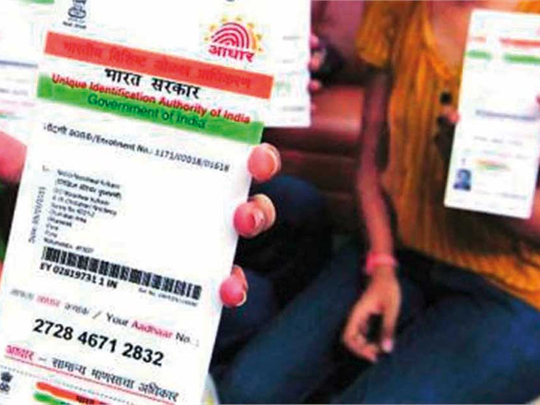
The Supreme Court Wednesday declared the Centre's flagship Aadhaar scheme as constitutionally valid but struck down some of its provisions including its linking with bank accounts, mobile phones and school admissions.
A five-judge constitution bench headed by Chief Justice Dipak Misra held that while Aadhaar would remain mandatory for filing of IT returns and allotment of Permanent Account Number (PAN), it would not be mandatory to link Aadhaar to bank accounts and telecom service providers cannot seek its linking of Aadhaar for mobile connections.
Not mandatory for schools, mobiles
It would also not be mandatory for school admissions, as also for the examinations conducted by the Central Board of Secondary Examination, National Eligibility cum Entrance Test for medical entrance and the University Grants Commission.
The bench also struck down the national security exception under the Aadhaar (Targeted Delivery of Financial and other Subsidies, Benefits and Services) Act.
It said Aadhaar is meant to help the benefits reach the marginalised sections of society and takes into account the dignity of people not only from personal but also community point of view.
Serving public interest
The top court said Aadhaar is serving much bigger public interest. Aadhaar means unique and it is better to be unique than being best.
There are three sets of judgements being pronounced. The first of the three verdicts was pronounced by Justice A K Sikri who wrote the judgement for himself, CJI and Justice A M Khanwilkar.
Justice Chandrachud and Justice A Bhushan, who are part of the bench, have written their individual opinions.
Justice Sikri struck down Section 57 of Aadhaar Act permitting private entities to avail Aadhaar data and ruled that Aadhaar authentication data cannot be stored for more than six months.
It directed the government not to give Aadhaar to illegal immigrants.
Aadhaar as Money bill
The apex court upheld passing of Aadhaar Bill as Money Bill by the Lok Sabha. The Congress party and its leader Jairam Ramesh had challenged the passage of the bill in the House.
It said there is nothing in the Aadhaar Act that violates right to privacy of an individual.
Justice Sikri said robust data protection regime has to be brought in place as early as possible.
He said the attack on Aadhaar by petitioners was based on violation of rights under the Constitution, which they felt will lead to a surveillance State.
Observing that there has been minimal demographic and biometric data collected by UIDAI for Aadhaar enrolment, Justice Sikri said unique identification proof also empowered and gave identity to marginalised sections of society.
No duplicate Aadhaar card
There is no possibility of obtaining a duplicate Aadhaar card, he said, adding there is sufficient defence mechanism for authentication in Aadhaar scheme.
The concept of human dignity has been enlarged in the judgement, he said.
The verdict was pronounced on a batch of pleas challenging the constitutional validity of Aadhaar scheme and its enabling 2016 law.
The bench had on May 10 reserved the verdict on the matter after a marathon hearing that went on for 38 days, spanning four-and-half months.
Bank accounts, mobile connections
Aadhaar will not mandated for opening of bank accounts. Aadhaar will not mandatory for mobile connections.
Aadhaar link to PAN
139AA of Income Tax Act upheld It is mandatory quoting of Aadhaar / Enrolment ID of Aadhaar application form, for filing of return of income and for making an application for allotment of Permanent Account Number.
No person's right can be denied on the ground of lack of Aadhaar. UGC, NEET, CBSE, Schools cannot ask for Aadhaar number.
No child can be denied any schemes if they are not able to bring their Aadhaar number.
Justice Sikri
Education has taken us from thumb impression to signature, technology has taken us from signature to thumb impression.
Proportionality is to be adjudged after laying down certain norms: privacy, whether there's larger public interest, compelling judgment.
Human dignity is already a settled right from an individual's point of view. Discusses elaborately on the dignity of an individual.
Justice Sikri continues
Justices Sikri has written summary of the judgment that runs to 40 pages. He is reading out the majority judgment at present.
Aadhaar eliminates any chance of duplication, Justice Sikri observes. Sikri also states that enrolment was fool proof.
Uniqueness is the fundamental difference between Aadhaar and other identity proofs. Minimal data is collected for establishing identity under Aaadhar.
Aadhaar has become the most discussed subject in recent past: Justices Sikri, Aadhaar identification is unparalleled. It empowers the marginalized sections of society by giving them an identity.












